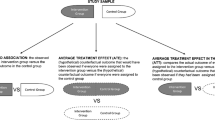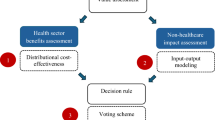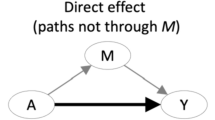Abstract
Smoking during pregnancy is a leading preventable cause of poor pregnancy outcomes and immediate and longer-term adverse health outcomes among exposed offspring. Developing more effective smoking cessation interventions for pregnant women has been a public health priority for more than 30 years. We review developments over the past 3 years (2012–2015) on the use of financial incentives to promote smoking cessation among pregnant women. We searched the literature for reports on primary and secondary analyses and reviews of controlled trials on this topic published in peer-reviewed journals using the search engine PubMed, reviewed bibliographies of published articles, and consulted expert colleagues. The search revealed several important developments, with the following three being especially noteworthy. First, the review identified four new randomized controlled trials, three of which further supported the efficacy of this treatment approach. One of the three trials supporting efficacy also included the first econometric analysis of this treatment approach showing financial incentives with pregnant smokers to be highly cost-effective. Second, two Cochrane reviews were published during this 3-year period covering the more recent and earlier efficacy trials. Meta-analyses in both reviews supported the efficacy of the approach. Lastly, the first effectiveness trial was reported demonstrating that financial incentives increased abstinence rates above control levels when implemented by obstetrical clinic staff in a large urban hospital working with community tobacco interventionists. Overall, there is a growing and compelling body of evidence supporting the efficacy and cost-effectiveness of financial incentives for smoking cessation among pregnant women.

Similar content being viewed by others
References
Papers of particular interest, published recently, have been highlighted as: • Of importance •• Of major importance
Kandel DB, Griesler PC, Schaffran C. Educational attainment and smoking among women: risk factors and consequences for offspring. Drug Alcohol Depend. 2009;104 Suppl 1:S24–33.
Graham H, Hawkins SS, Law C. Lifecourse influences on women’s smoking before, during and after pregnancy. Soc Sci Med. 2010;70(4):582–7.
Bloch M, Althabe F, Onyamboko M, et al. Tobacco use and secondhand smoke exposure during pregnancy: an investigative survey of women in 9 developing nations. Am J Public Health. 2008;98(10):1833–40.
Chamberlain C, O’Mara-Eves A, Oliver S, et al. Psychosocial interventions for supporting women to stop smoking in pregnancy. Cochrane Database Syst Rev. 2013;10:CD001055. One of a programmatic series of meta-analyses reviewing controlled trials on smoking-cessation for pregnant women.
Bakker JJ, Jaddoe VW. Cardiovascular and metabolic influences of fetal smoke exposure. Eur J Epidemiol. 2011;26(10):763–70. Provides evidence relating in utero exposure to maternal cigarette smoking to adult risk for cardiovascular and metabolic disorders.
Cnattingius S. The epidemiology of smoking during pregnancy: smoking prevalence, maternal characteristics, and pregnancy outcomes. Nicotine Tob Res. 2004;Suppl 2:S125–40.
Dietz PM, England LJ, Shapiro-Mendoza CK, et al. Infant morbidity and mortality attributable to prenatal smoking in the U.S. Am J Prev Med. 2010;39(1):45–52.
Holz NE, Boecker R, Baumeister S, et al. Effect of prenatal exposure to tobacco smoke on inhibitory control: neuroimaging results from a 25-year prospective study. JAMA Psychiatry. 2014;71(7):786–96. Provides evidence relating in utero exposure to maternal cigarette smoking to adult risk for neurobehavioral deficits.
Jiang X, Ma H, Wang Y, et al. Early life factors and type 2 dibetes mellitus. J Diabetes Res. 2013;2013:485082. Provides evidence relating in utero exposure to maternal cigarette smoking to adult risk for type 2 diabetes.
Suter MA, Anders AM, Aagaard KM. Maternal smoking as a model for environmental epigenetic changes affecting birth weight and fetal programming. Mol Hum Reprod. 2013;19(1):1–6.
Adams EK, Melvin CL, Raskind-Hood C, et al. Infant delivery costs related to maternal smoking: an update. Nicotine Tob Res. 2011;13:627–37.
Lumley J, Chamberlain C, Dowswell T, et al. Interventions for promoting smoking cessation during pregnancy. Cochrane Database Syst Rev. 2009:(3):CD001055.
Higgins ST, Budney AJ, Bickel WK, et al. Incentives improve outcome in outpatient behavioral treatment of cocaine dependence. Arch Gen Psychiatry. 1994;51(7):568–76.
Silverman K, Higgins ST, Brooner RK, et al. Sustained cocaine abstinence in methadone maintenance patients through voucher-based reinforcement therapy. Arch Gen Psychiatry. 1996;53(5):409–15.
Higgins ST, Silverman K, Sigmon SC, et al. Incentives and health: an introduction. Prev Med. 2012;55(Suppl):S2–6. Provides a detailed introduction to the conceptual and empirical rationales for using financial incentives to promote health-related behavior change.
Higgins ST, Sigmon SC, Heil SH. Contingency management in the treatment of substance use disorders: trends in the literature. In: Ruiz P, Strain E, editors. Lowinson & Ruiz’s Substance Abuse: A comprehensive textbook. 5th ed. Baltimore: Lippincott, Williams & Wilkins; 2011. p. 603–21.
Lussier JP, Heil SH, Mongeon JA. A meta-analysis of voucher-based reinforcement therapy for substance use disorders. Addiction. 2006;101(2):192–203.
Davis DR., Kurti AN., Redner R., et al. A Review of the literature on contingency management in the treatment of substance use disorders, 2009–2015. Poster presented at the 3rd annual conference on Behavior Change, Health, and Health Disparities, Oct 2–3, 2015, Burlington, VT.
Higgins ST, Silverman K, Washio Y. Contingency management. In: Galanter M, Kleber HD, editors. Psychotherapy for the treatment of substance abuse. 6th ed. Washington, D.C: American Psychiatric Publishing, Inc; 2011. p. 193–218.
Cahill K, Hartmann-Boyce J, Perera R. Incentives for smoking cessation. Cochrane Database Syst Rev. 2015;5:CD004307. Provides a meta-analysis of controlled studies on the use of financial incentives to promote smoking cessation overall and among pregnant women.
Higgins ST, Washio Y, Heil SH, et al. Financial incentives for smoking cessation among pregnant and newly postpartum women. Prev Med. 2012;55(Suppl):S33–40. Provides a detailed review of a programmatic series of controlled trials from two research groups investigating the efficacy of financial incentives for smoking cessation among pregnant and newly postpartum women.
Tuten M, Fitzsimons H, Chisolm MS, et al. Contingent incentives reduce cigarette smoking among pregnant, methadone-maintained women: results of an initial feasibility and efficacy randomized clinical trial. Addiction. 2012;107(10):1868–77. The only randomized controlled clinical trial demonstrating the efficacy of financial incentives for smoking cessation among opioid-dependent pregnant women.
Ondersma SJ, Svikis DS, Lam PK, et al. A randomized trial of computer-delivered brief intervention and low-intensity contingency management for smoking during pregnancy. Nicotine Tob Res. 2012;14(3):351–60.
Higgins ST, Washio Y, Lopez AA, et al. Examining two different schedules of financial incentives for smoking cessation among pregnant women. Prev Med. 2014;68:51–7. Original randomized controlled clinical trial supporting the efficacy of financial incentives for smoking cessation among pregnant and newly postpartum women and for increasing fetal growth.
Tappin D, Bauld L, Purves D, et al. Financial incentives for smoking cessation in pregnancy: randomized controlled trial. BMJ. 2015;350:h134. The largest randomized controlled clinical trial supporting the efficacy of financial incentives for smoking cessation among pregnant and newly postpartum women.
Donatelle RJ, Prows SL, Champeau D, et al. Randomized controlled trial using social support and financial incentives for high risk pregnant smokers: significant other supporter (SOS) program. Tob Control. 2000;9 Suppl 3:lll67–9.
Donatelle RJ, Prows SL, Champeau D, et al. Using social support, biochemical feedback, and incentives to motivate smoking cessation during pregnancy: comparison of three intervention trials. 2000; Poster presented at the annual meeting of the American Public Health Association, Boston, MA. Reported in Donatelle et al. 2004 [38].
Donatelle R, Hudson D, Dobie S, et al. Incentives in smoking cessation: status of the field and implications for research and practice with pregnant smokers. Nicotine Tob Res. 2004;6 Suppl 2:S163–79.
Higgins ST, Heil SH, Solomon LJ, et al. A pilot study on voucher-based incentives to promote abstinence from cigarette smoking during pregnancy and postpartum. Nicotine Tob Res. 2004;6(6):1015–20.
Higgins ST. Unpublished trial results reported in Higgins ST, Washio Y, Heil SH, et al. Financial incentives for smoking cessation among pregnant and newly postpartum women. Prev Med. 2012;55 (Suppl):S33-40.
Heil SH, Higgins ST, Bernstein IM, et al. Effects of voucher-based incentives on abstinence from cigarette smoking and fetal growth among pregnant women. Addiction. 2008;103(6):1009–18.
Jones HE, Heil SH, Tuten M, et al. Cigarette smoking in opioid-dependent pregnant women: neonatal and maternal outcomes. Drug Alcohol Depend. 2013;131(3):271–7. Outlines how maternal cigarette smoking may exacerbate the neonatal abstinence syndrome observed in opioid-exposed neonates.
Sigmon SC, Patrick M, Meyer AC, (2016). Financial incentives to promote extended smoking abstinence in opioid-maintained patients: A randomized trial. Addiction.
Higgins ST, Heil SH, Dumeer AM, et al. Smoking status in the initial weeks of quitting as a predictor of smoking-cessation outcomes in pregnant women. Drug Alcohol Depend. 2006;85(2):138–41.
Higgins ST, Bernstein IM, Washio Y, et al. Effects of voucher-based contingency management on birth outcomes. Addiction. 2010;105(11):2023–30.
Higgins TM, Higgins ST, Heil SH, et al. Effects of cigarette smoking cessation on breastfeeding duration. Nicotine Tob Res. 2010;12(5):483–8.
Lopez AA, Skelly JM, Higgins ST. Financial incentives for smoking cessation among depression-prone pregnant and newly postpartum women: effects on smoking abstinence and depression ratings. Nicotine Tob Res. 2015;17(4):455–62. Provides compelling evidence that using financial incentives for smoking cessation among depression-prone pregnant cigarette smokers increases smoking cessation while also decreasing late-pregnancy and postpartum depressive symptoms.
Lopez AA, Skelly JM, White TJ, et al. Does impulsiveness moderate response to financial incentives for smoking cessation among pregnant and newly postpartum women? Exp Clin Psychopharmacol. 2015;23(2):97–108. Provides evidence that the efficacy of financial incentives is not moderated by individual differences in discounting of delayed rewards.
Boyd KA, Briggs AH, Bauld L, et al. Are financial incentives cost-effective to support smoking cessation during pregnancy? Addiction. 2015. Seminal study supporting the cost-effectiveness of financial incentives for smoking cessation with pregnant and newly postpartum women.
Stapleton JA, West R. A direct method and ICER tables for the estimation of the cost-effectiveness of smoking cessation interventions in general populations: application to a new cytosine trial andother examples. Nicotine Tob Res. 2012;14(4):463–71.
Ierfino D, Mantzari E, Hirst J, et al. Financial incentives for smoking cessation in pregnancy: a single-arm intervention study assessing cessation and gaming. Addiction. 2015;110(4):680–8. Seminal trial demonstrating that financial incentives for smoking cessation among pregnant and newly postpartum women can be effectively delivered in a community hospital obstetrical clinic using clinical staff.
Lasser K, Boyd JW, Woolhandler S, et al. Smoking and mental illness: a population-based prevalence study. JAMA. 2000;284(20):2606–10.
Petry NM, Alessi SM, Rash CJ. Contingency management treatments decrease psychiatric symptoms. J Consult Clin Psychol. 2013;81(5):926–31.
Chivers LL, Hand DJ, Priest JS, et al. E-cigarette use among women of reproductive age: cigarette smoking status, impulsivity, and other predictors. Poster presented at the 3rd annual conference on Behavior Change, Health, and Health Disparities, Oct 2–3, 2015, Burlington, VT.
White TJ, Redner R, Skelly JM, et al. Examining educational attainment, prepregnancy smoking rate, and delay discounting as predictors of spontaneous quitting among pregnant smokers. Exp Clin Psychopharmacol. 2014;22(5):384–91.
Greiner AC, Elisa K, editors. Health professions education: a bridge to quality. Washington, D.C: National Academies Press; 2003.
Author information
Authors and Affiliations
Corresponding author
Ethics declarations
Conflict of Interest
Stephen T. Higgins and Laura J. Solomon declare that they have no conflict of interest.
This research was supported by Research Grant R01HD075669 from the National Institute of Child Health and Human Development and Centers for Disease Control and Prevention and Research Grant R01HD078332 from the National Institute of Child Health and Human Development and Center of Biomedical Research Excellence award P20GM103644 from the National Institute of General Medical Sciences. The funding sources had no other role in this project other than financial support.
Human and Animal Rights and Informed Consent
Among cited articles where one of the authors of the current report were authors, local Institutional Review Board approval was obtained and maintained for studies where human (or animal) subjects research was performed.
Additional information
All authors contributed in a significant way to the manuscript and all authors have read and approved this submission.
This article is part of the Topical Collection on Tobacco
Rights and permissions
About this article
Cite this article
Higgins, S.T., Solomon, L.J. Some Recent Developments on Financial Incentives for Smoking Cessation Among Pregnant and Newly Postpartum Women. Curr Addict Rep 3, 9–18 (2016). https://doi.org/10.1007/s40429-016-0092-0
Published:
Issue Date:
DOI: https://doi.org/10.1007/s40429-016-0092-0




